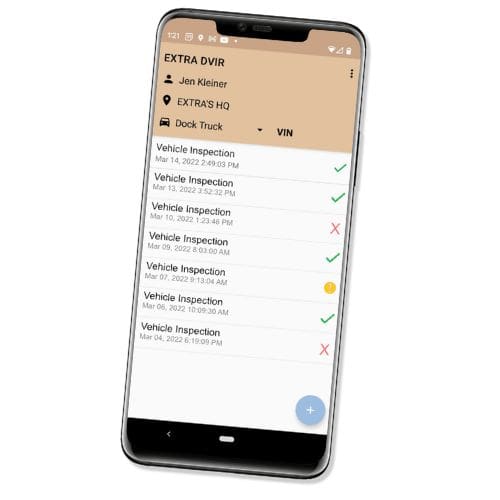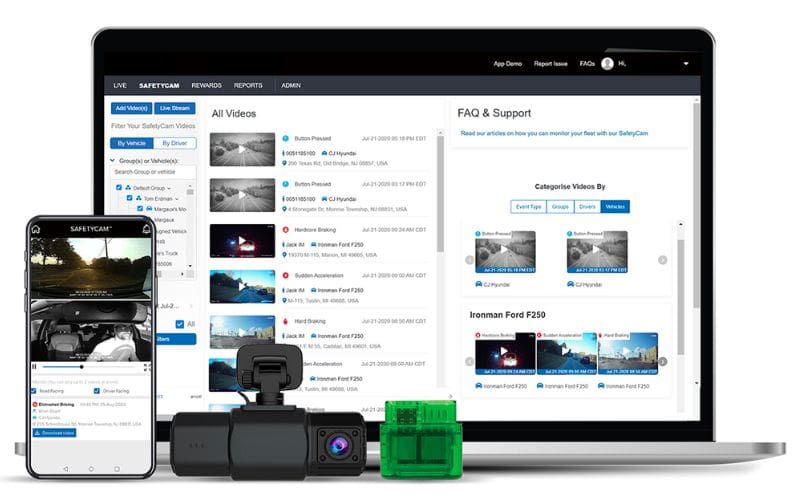
Striking the right balance between cost and efficiency is the key to success in small fleet management. Today, we’re taking a look at proven and multifaceted strategies that small fleet operators can use to navigate the unique challenges they face daily. From optimizing routes and maintaining vehicles to using cutting-edge technology, we’ll review ways that small fleet managers can make the most of their resources, reduce operational costs, and stay highly competitive.
If you’re a small fleet manager seeking to enhance your operational strategies, this guide is for you. We’ll highlight the transformative impact of integrating the right tools and strategies into your business operations. We’ll also explain how the adoption of tailored solutions can lead to significant improvements in your fleet’s management and overall business success. Let’s get started!
Tips for Small Fleet Management
1. Maintenance Best Practices

A proactive maintenance schedule is vital in small fleet management. Keeping fleet vehicles serviced helps prevent breakdowns, reduces costly repairs, and minimizes downtime. Fleets that stick to a strict maintenance schedule cut down their vehicle out-of-service time by as much as 35% according to a study by the Federal Motor Carrier Safety Administration (FMCSA). Regular maintenance checks are a great way to ensure your fleet vehicles are kept in a perpetual state of readiness.
Monitoring vehicle health using Daily Vehicle Inspection Reports (DVIRs) and other reputable diagnostic tools is important for spotting issues early on before they escalate into major problems. The use of DVIRs and other tools offers a comprehensive view of a vehicle’s condition. It can detect potential issues like engine troubles or tire wear before they grow into expensive repairs or present potentially dangerous situations. By adopting a proactive stance on fleet vehicle maintenance, you not only save time and money but also extend the life of the fleet which can be a very cost-effective strategy.
2. Cost-Effective Fuel Management
To effectively manage fuel usage in a small fleet, you need to implement and stick to common-sense strategies. According to the U.S. Department of Energy, training drivers in fuel-efficient driving practices can improve fuel usage by as much as 33%. Basic vehicle maintenance like monitoring tire pressure and strictly following the vehicle’s recommended service schedule can also make a real difference in managing fuel consumption. Simple fuel cards can be easily used to manage and track fuel expenditures.
Beyond the traditional fuel management methods, some alternative fuels and technologies present opportunities for long-term savings. As more electric vehicles (EVs) and hybrid vehicles are produced, and their prices come down, they become viable options for small fleet vehicles. EVs can reduce operating costs by 40% when compared to traditional gas-powered vehicles according to U.S. Energy Information Administration reports. The Iowa Renewable Fuels Association estimates that alternative fuels like biodiesel can reduce greenhouse gas emissions by as much as 86%. These strategies help small fleets manage costs and align with growing environmental concerns.
3. Optimize Route Planning and Scheduling
When it comes to small fleet management, optimizing routes and schedules should be a top priority, especially for small businesses with tight budgets. Businesses that strategically plan their routes not only boost their operational efficiency but also significantly cut down on travel time and fuel usage. According to a study by the American Transportation Research Institute (ATRI), route optimization can lead to a 10-30% reduction in overall transportation costs. Keep in mind, that with a notable decrease in total mileage, you’ll also see reduced costs for vehicle maintenance.
Route optimization tools do most of the heavy lifting for you, pinpointing the quickest and most fuel-efficient routes. Taking into account relevant factors like distance, delivery windows, and traffic conditions, these tools ensure that fleets operate at optimal efficiency. Optimized routing can reduce fuel usage by up to 20% according to the Environmental Protection Agency (EPA). This saves money and reduces the environmental impact of your fleet’s operations.
Balancing delivery schedules is also an important aspect of this, necessary for maintaining a high level of service while minimizing operational costs. It means carefully planning to meet customer needs without putting too much strain on any one vehicle or driver. Increased vehicle utilization is important for smaller fleets that must improve service delivery and make the most of their resources.
4. Driver Training and Accountability
Ongoing training for drivers is a critical component of fleet management. Regular training ensures that drivers are up-to-date on best practices for safe and efficient driving. This should include defensive driving techniques that can help reduce the risk of accidents and fuel-efficient driving techniques to improve your company’s fuel economy. Refresher courses on adherence to traffic laws are also a good idea as they help maintain safety standards and reduce the likelihood of fines and legal issues.
You’ll also want to set clear performance metrics for your fleet to ensure driver accountability. Tracking things like fuel usage, adherence to schedules, and compliance with safety protocols gives you measurable standards for driver performance. By monitoring these aspects, fleet managers can identify areas for improvement and recognize drivers who consistently meet or exceed expectations. Tracking these metrics helps you boost the efficiency of your operations and helps you build and promote a safer driving environment. It’s an approach that keeps everyone accountable and offers continuous improvement within the fleet.
5. Utilizing Technological Solutions
One great way to enhance your overall operations is by making GPS tracking systems an integral part of fleet management. Today’s advanced systems provide real-time visibility of fleet vehicles, allowing managers to closely monitor the location, speed, and route adherence of any vehicle at any given time.
What GPS tracking systems bring to the table for your fleet management is significant. Fleets using these systems have seen a 12% increase in profits and a 13% drop in fuel costs according to a study by the Aberdeen Group. With the real-time data from these systems, you can make sure drivers are fully complying with all company policies, greatly improve customer service, and optimize routes. The Aberdeen Group study also revealed that GPS tracking improves route efficiency by as much as 25%.
If you’re looking for more extensive insights into your fleet’s operation, you might also consider fleet management software solutions like those offered by Elite EXTRA. On top of real-time vehicle diagnostics, adherence to insurance compliance, and technologies for safer driving, it incorporates vehicle telematics via OBD devices, front and rear-facing dash cams, a driver gamification app, and fleet tracking. It also provides driver training programs, scheduled maintenance tracking, eLogs (ELD), and driver rewards, and integrates with routing and dispatch solutions to simplify and automate vehicle management across an entire fleet.
Tools for Small Fleet Management
1. Fleet Management Software
Fleet management software is a dynamic tool that streamlines operations, enhancing efficiency and reducing costs. It integrates various aspects of fleet management into a single cohesive system. Fleet management software is particularly beneficial to smaller fleets because it offers cost-effective solutions for optimizing operations. Smaller fleets often operate with tighter budgets and less administrative support compared to larger companies. These software solutions provide a centralized system for route planning, maintenance tracking, and driver management, which helps in maximizing resources and reducing operational costs. Its ability to deliver real-time data and analytics is also crucial for making informed decisions, enhancing both efficiency and profitability for small fleet operators.
Key Features:
- Route Optimization: Determines the most efficient routes, saving time and fuel.
- Maintenance Tracking: Monitors vehicle servicing schedules to prevent breakdowns.
- Driver Performance Analysis: Evaluates driver behavior to improve safety and efficiency.
- Fuel Management: Tracks and optimizes fuel usage for cost savings.
- Vehicle Diagnostics: Provides real-time information on vehicle health.
- Compliance Management: Ensures adherence to legal and regulatory standards.
- Reporting and Analytics: Delivers insights for informed decision-making.

2. Telematics and GPS Tracking Devices
Telematics systems are integral in modern fleet management, offering detailed monitoring of vehicle performance and driver behavior. These systems provide real-time data on vehicle health, ensuring timely maintenance and reducing the risk of breakdowns. GPS tracking also aids in route optimization, which reduces unnecessary wear and tear on vehicles, further minimizing downtime. These devices optimize routes, which saves time and fuel. They also enhance fleet security and assist in theft prevention. The data collected from these systems is invaluable for fleet analysis, allowing managers to make timely informed decisions, improve efficiency, and potentially lower insurance premiums due to improved safety measures.

Key Features:
- Real-Time Vehicle Tracking: Know the exact location of each vehicle in the fleet at all times.
- Route Optimization: GPS data helps in planning the most efficient routes, saving time and fuel.
- Driver Behavior Monitoring: Telematics can track driving habits, promoting safer and more efficient driving.
- Vehicle Maintenance Alerts: Receive notifications about vehicle health, aiding in timely maintenance.
- Improved Security: GPS tracking enhances vehicle security and aids in theft recovery.
- Fuel Usage Monitoring: Keep track of fuel consumption to identify areas for cost reduction.
- Enhanced Compliance: Helps in adhering to regulatory standards and reporting.
3. Maintenance Management Systems
If you’re looking to enhance your fleet’s longevity and reliability, you might consider integrating a digital maintenance management system into your fleet operations. These systems offer huge benefits for small fleets, as they streamline the maintenance process, reduce downtime due to vehicle breakdowns, and ultimately save on costs. By keeping vehicles in optimal condition, smaller fleet vehicles will always be ready for operation, boosting overall effectiveness and service reliability.
Key Features:
- Scheduled Maintenance Tracking: Automates the scheduling of regular check-ups and services.
- Maintenance History Records: Keeps a detailed log of past maintenance activities.
- Real-Time Alerts: Sends notifications for upcoming maintenance or potential issues.
- Vehicle Health Monitoring: Uses diagnostics to assess vehicle condition continuously.
- Parts Inventory Management: Tracks spare parts and facilitates timely ordering.
- Cost Tracking and Analysis: Monitors maintenance costs for budget management.
- Regulatory Compliance: Helps in maintaining compliance with vehicle maintenance regulations.
- Customizable Reports: Generates tailored reports for better insights and decision-making.
4. Returns Management Software
For businesses that handle product returns, returns management software is a tool that you can’t afford to be without. It automates various aspects, like processing returns, managing policies, and tracking returns in real time. This reduces manual effort and errors. The software also enhances customer communication, providing updates on return status and offering real transparency. It also integrates with inventory management, updating stock levels as returns are processed, and seamlessly manages refunds or replacements, all of which contribute to a smoother, more customer-friendly returns experience.
Key Features:
- Automated Return Processing: Streamlines the return process, reducing manual efforts.
- Return Policy Management: Customizes and enforces return policies.
- Real-Time Tracking of Returns: Provides updates on the status of returned items.
- Customer Communication Tools: Facilitates effective communication with customers regarding returns.
- Analytics and Reporting: Offers insights into return trends and customer behavior.
- Inventory Management Integration: Updates inventory levels in real time as returns are processed.
- Refund and Replacement Management: Manages refund or replacement processes efficiently.

Harnessing Efficiency in Small Fleet Management
If you’re managing a small fleet, the path to success involves a blend of strategic planning, technological integration, and a commitment to continuous improvement. By embracing these principles, small fleet operators can boost their overall operations and significantly reduce costs, giving them a competitive edge in a fast-evolving industry.
Key Takeaways for Small Fleet Management
- Strategic Planning: Optimize routes and schedules for efficiency and cost savings.
- Technological Integration: Utilize fleet management software and GPS tracking for enhanced control and insights.
- Proactive Maintenance: Implement regular vehicle check-ups to reduce downtime and extend fleet longevity.
- Fuel Efficiency: Adopt fuel management strategies and explore alternative fuels for cost reduction and environmental benefits.
- Driver Training and Accountability: Regularly train drivers and set clear performance metrics for safety and efficiency.
- Continuous Improvement: Regularly assess and adapt strategies to meet evolving fleet management needs.
It’s important to recognize that solutions like those provided by Elite EXTRA play an important role in making these management goals a reality. These tools and strategies are specifically tailored to the needs of smaller fleets. By using the proven tips and innovative tools detailed here, small fleet managers can navigate the challenges they face with greater confidence and capability, steering their operations toward sustained growth and success. Contact us today to explore how we can help improve your fleet management!
Sources
https://www.epa.gov/ports-initiative/drayage-truck-best-practices-improve-air-quality
https://www.fmcsa.dot.gov/safety/research-and-analysis/large-truck-crash-causation-study-analysis-brief
https://afdc.energy.gov/files/u/ publication/10_G00888_savings_WEB.pdf
https://www.energy.gov/eere/vehicles/ articles/fotw-1190-june-14-2021-battery-electric-vehicles-have-lower-scheduled







